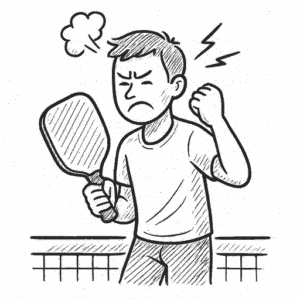
Your Pickleball Losing Streak: The Mental Game Nobody Talks About
Common Mental Blocks During a Losing Streak
A losing streak amplifies psychological hurdles that sabotage performance. Here are the most common mental blocks pickleball players face:
- Overthinking: Dwelling on missed shots disrupts flow, especially in high-pressure tournaments.
- Fear of Failure: Worrying about another loss leads to cautious, ineffective play.
- Loss of Focus: Opponents’ banter or crowd noise can derail concentration at pivotal moments.
- Negative Self-Talk: Thoughts like “I’m blowing it” reinforce doubt and hesitation.
- Scoreboard Obsession: Fixating on a trailing score shifts focus from strategy to panic.
During the 2022 APP Tour in Mesa, Arizona, top players cited mental fatigue as a key reason for unexpected defeats, proving even elites battle these challenges.
Strategies to Overcome the Mental Slump
Breaking a losing streak demands targeted mental strategies. Here are practical, research-backed methods for pickleball players:
- Pre-Point Rituals: Use consistent routines, like adjusting your grip or taking a deep breath, to stay grounded.
- Visualization: Picture successful shots before stepping on the court. A 2020 study in The Sport Psychologist confirmed visualization boosts performance under stress.
- Reframe Defeats: Treat losses as data, not disasters. Anna Leigh Waters credited this mindset for her 2019 comeback after a rough patch.
- Mindfulness Practice: Stay in the moment with techniques from apps like Headspace, tailored to pickleball’s fast pace.
- Positive Cues: Say “Let’s go!” or “Next shot!” to disrupt negative thoughts, a tactic doubles teams use to stay aligned.
Off-court habits, like journaling or consulting a sports psychologist, also build resilience. Since 2023, many pickleball clubs have offered mental game clinics, reflecting growing awareness of its importance.
Notable Players and Their Mental Game
Top pickleball players have shared how they tackle mental hurdles, offering lessons for all levels:
- Ben Johns: The No. 1 player (as of 2025) adopted meditation in 2020 after a rare loss, crediting it for his unshakable focus.
- Simone Jardim: A women’s pickleball legend, Jardim worked with a sports psychologist in 2018 to overcome a slump, mastering emotional control.
- Collin Johns: Known for his poise, Johns uses visualization before matches.
These pros show mental toughness is a skill anyone can develop, not a gift reserved for champions.